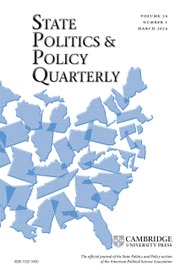Crossref Citations
This article has been cited by the following publications. This list is generated based on data provided by
Crossref.
Cohen, Jeffrey E.
and
King, James D.
2004.
Relative Unemployment and Gubernatorial Popularity.
The Journal of Politics,
Vol. 66,
Issue. 4,
p.
1267.
King, James D.
and
Cohen, Jeffrey E.
2005.
What Determines a Governor's Popularity?.
State Politics & Policy Quarterly,
Vol. 5,
Issue. 3,
p.
225.
Anderson, Cameron D.
2006.
Economic Voting and Multilevel Governance: A Comparative Individual‐Level Analysis.
American Journal of Political Science,
Vol. 50,
Issue. 2,
p.
449.
Arceneaux, Kevin
2006.
The Federal Face of Voting: Are Elected Officials Held Accountable for the Functions Relevant to Their Office?.
Political Psychology,
Vol. 27,
Issue. 5,
p.
731.
Anderson, Cameron D.
2008.
Economic Voting, Multilevel Governance and Information in Canada.
Canadian Journal of Political Science,
Vol. 41,
Issue. 2,
p.
329.
Johns, Robert
2011.
Credit Where it’s Due? Valence Politics, Attributions of Responsibility, and Multi-Level Elections.
Political Behavior,
Vol. 33,
Issue. 1,
p.
53.
Ulbig, Stacy G.
and
Miller, Nancy Martorano
2012.
The Coingate effect: The impact of scandal on attitudes toward, state and federal political actors.
The Social Science Journal,
Vol. 49,
Issue. 1,
p.
61.
Wolak, Jennifer
and
McAtee, Andrea
2013.
Parties in the Public Eye.
State Politics & Policy Quarterly,
Vol. 13,
Issue. 3,
p.
398.
Beck, John H.
and
Henrickson, Kevin E.
2013.
The Effect of the Top Two Primary on the Number of Primary Candidates.
Social Science Quarterly,
Vol. 94,
Issue. 3,
p.
777.
Peterson, Amanda N
2014.
The Impact of Municipal Governance on Cities' Audit Outcomes.
SSRN Electronic Journal,
Bosch, Agusti
2016.
Types of Economic Voting in Regional Elections: The 2012 Catalan Election as a Motivating Case.
Journal of Elections, Public Opinion and Parties,
Vol. 26,
Issue. 1,
p.
115.
Park, Jeeyoung
and
Norpoth, Helmut
2016.
Policy popularity: The Arizona immigration law.
Electoral Studies,
Vol. 44,
Issue. ,
p.
15.
Amaral, Oswaldo E. do
and
Tanaka, Marcela
2016.
Como os brasileiros escolhem os governadores? Desvendando as razões do voto para os executivos estaduais no Brasil em 2014.
Opinião Pública,
Vol. 22,
Issue. 3,
p.
675.
Aji, Nurdien
and
Dartanto, Teguh
2018.
Behind the Jokowi’s victory: did economic voting matter in the 2014 Indonesian presidential election?.
Asia-Pacific Journal of Regional Science,
Vol. 2,
Issue. 1,
p.
115.
Toubeau, Simon
and
Wagner, Markus
2018.
Party support in multi-level elections: the influence of economic perceptions and vertical congruence.
Electoral Studies,
Vol. 54,
Issue. ,
p.
22.
Beazer, Quintin H.
and
Reuter, Ora John
2019.
Who Is to Blame? Political Centralization and Electoral Punishment under Authoritarianism.
The Journal of Politics,
Vol. 81,
Issue. 2,
p.
648.
Barberia, Lorena
Avelino, George
and
Zanlorenssi, Gabriel
2019.
Economic Voting in Brazil’s Gubernatorial Elections, 1994–2014.
Publius: The Journal of Federalism,
Vol. 49,
Issue. 2,
p.
250.
Ivonchyk, Mikhail
2020.
Gubernatorial Policy Priorities and State Fiscal Outcomes.
Politics & Policy,
Vol. 48,
Issue. 3,
p.
490.
M. DYNES, ADAM
and
HOLBEIN, JOHN B.
2020.
Noisy Retrospection: The Effect of Party Control on Policy Outcomes.
American Political Science Review,
Vol. 114,
Issue. 1,
p.
237.
Cohen, Jeffrey E.
2020.
Relative Unemployment, Political Information, and the Job Approval Ratings of State Governors and Legislatures.
State Politics & Policy Quarterly,
Vol. 20,
Issue. 4,
p.
437.




